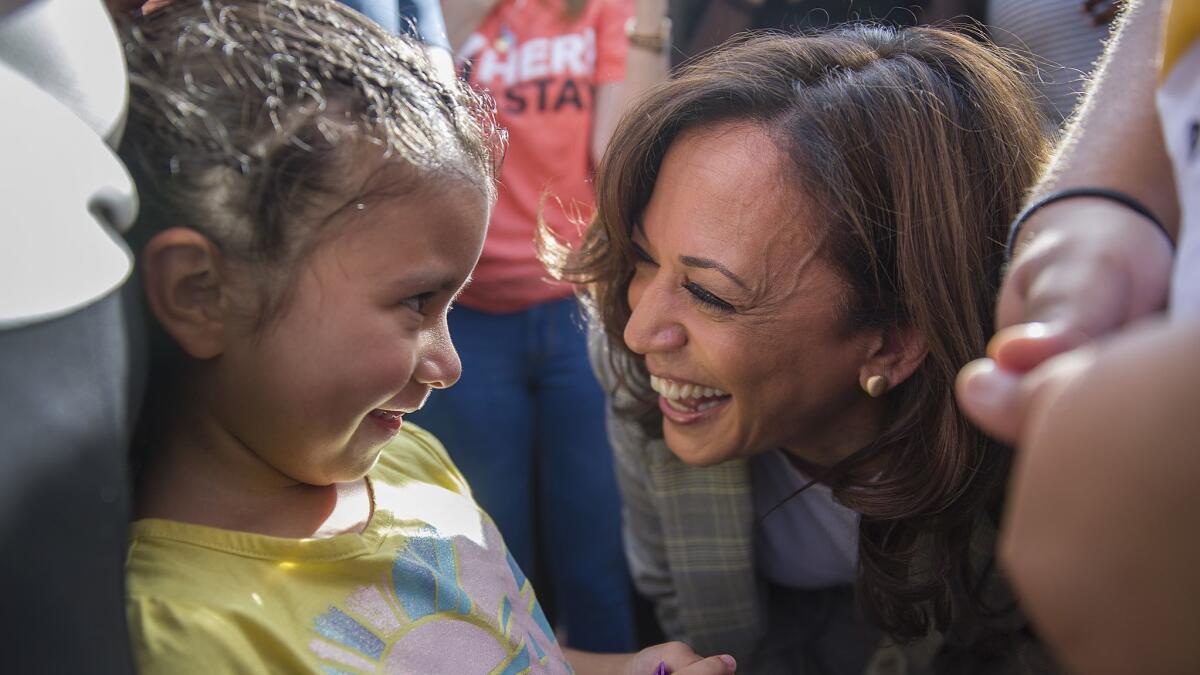Who won the Democratic debates? We’re starting to get answers

- Share via
Reporting from Washington — Sens. Kamala Harris and Elizabeth Warren gained substantial ground after last week’s Democratic presidential debates; former Vice President Joe Biden and former Rep. Beto O’Rourke declined.
Post-debate polls vary in their specifics, but all agree on the big picture: Biden still leads the field, but has a much shakier position. Harris, at least for now, has moved into rough parity with Sen. Bernie Sanders of Vermont and Warren, the Massachusetts senator.
The most recent poll, released Tuesday by Quinnipiac University, was the worst for Biden, showing him barely ahead of Harris, California’s junior senator, 22% to 20%. Warren, at 14%, and Sanders, at 13%, rounded out the top tier. No other candidate hit 5%.
That compared with an early June survey by Quinnipiac that showed Biden with 30% and Harris in fifth place at 7%.
A poll released Monday by Morning Consult done for the Fivethirtyeight.com website found that Harris jumped from 8% support nationwide before the debates to 17% afterward. Biden, by contrast, dropped from 39% to 31%.
Overall support for the other candidates did not shift significantly in the Morning Consult survey, although several, including Warren, Sen. Cory Booker of New Jersey and former Housing Secretary Julián Castro, saw significant jumps in the percentage of Democrats who view them favorably.
A CNN poll conducted Friday through Sunday also showed a tight race, with Harris and Warren each picking up support and Biden dropping to only a narrow lead.
Perhaps as ominously for Biden, a poll by YouGov for the Huffington Post found that the share of Democratic voters who see him as “capable of winning the general election” dropped significantly.
Kamala Harris, known for caution, finds a risky move pays off against Joe Biden »
Warren and Harris both gained significant ground on that measure, the poll showed. As a result, Biden went from having a big lead on electability to roughly a four-way tie with Warren, Harris and Sanders.
The belief that he is the most electable candidate has buoyed Biden’s campaign all spring, and a decline on that measure could pose a major problem for him.
In early May, 70% of Democrats and Democratic-leaning voters told YouGov they saw Biden as capable of winning. In a poll after the debate, that number dropped to 57%.
Harris and Warren went from about 4 in 10 Democratic voters thinking they could win to about half. The share who thought Sanders could win remained steady at slightly less than half, the YouGov poll found.
In the CNN poll, Biden continued to be the candidate Democrats thought had the best chance of beating President Trump. But he dropped significantly when voters were asked which candidate they supported.
Biden got support from 22% of those surveyed, down 10 points from a CNN poll in May. Harris at 17%, Warren 15% and Sanders at 14% were essentially tied for second. For Harris and Warren, that marked a jump of 9 and 8 points, respectively.
Warren dominated the first hour of Wednesday night’s debate. Thursday night’s featured Harris going on offense against Biden over his position on school busing early in his career and his recent expressions of nostalgia for his ability to work with segregationist senators. That attack dominated post-debate news coverage.
The Quinnipiac poll showed Biden continuing to lead among Democrats who described themselves as moderate or conservative, which has been a key area of strength for him.
But Harris had significantly eroded another source of Biden’s strength — backing from black voters. The poll showed her and Biden roughly equal among African Americans.
Two important caveats apply to all such polls: The impact of a big event, like a debate, often fades over time. And primary elections, unlike general elections, often see rapid shifts in support.
In the YouGov poll, for example, only 38% of voters said they had even a “good idea” of which candidate they’ll ultimately vote for. More than half said they were still making up their minds.
Morning Consult, a political polling and research firm, surveyed 7,150 registered voters nationwide who said they plan to vote in the Democratic primaries before the debate. They then re-surveyed 2,041 after the first night of the Democratic debates and 2,485 after the second night.
The survey has a margin of error of 1 percentage point in either direction for the pre-debate numbers and 2 percentage points for the post-debate ones.
YouGov conducted two surveys, June 27-28 and 28-29, each with 1,000 respondents. The estimated margin of error is 3 percentage points in either direction.
The CNN poll was conducted among 1,613 respondents and has a 3-point margin of error.
The Quinnipiac poll was conducted June 28 to July 1 among 554 Democrats and Democratic-leaning voters nationwide. The margin of error is 5 points.
More to Read
Get the L.A. Times Politics newsletter
Deeply reported insights into legislation, politics and policy from Sacramento, Washington and beyond. In your inbox twice per week.
You may occasionally receive promotional content from the Los Angeles Times.










